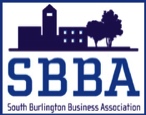
Not a member of the SBBA? Click here to download an enrollment form.
SBBA members share a common goal of making South Burlington a thriving and welcoming community for residents, businesses and visitors. South Burlington can not address our workforce, climate, public safety, education and affordability challenges if we don’t expand our tax base, foster economic opportunities and increase the supply of housing in our city. In order to build a diverse business community in South Burlington, the SBBA is backing an initiative to enhance community engagement in local and state issues. SupportSBBA’s advocacy work, donate to the SBBA PAC.